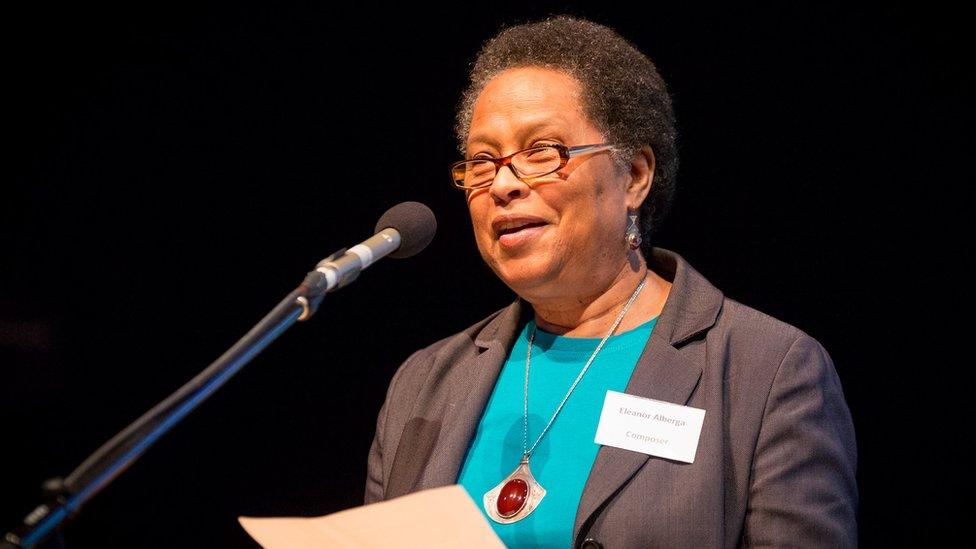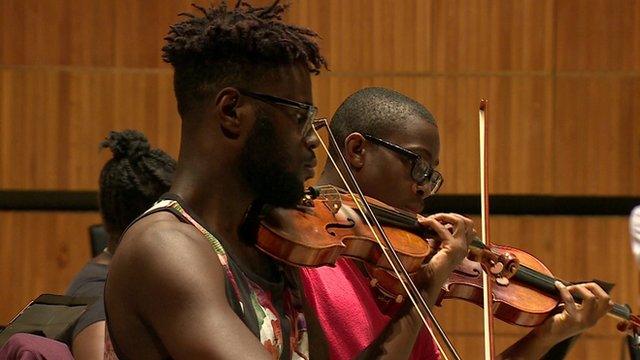Classical music 'excludes' composers from minorities
- Published

Eleanor Alberga spoke about 'a hesitancy or even condescension in welcoming black people as part of the classical music family'
Composers from minority groups are "effectively silenced" because they do not fit into classical music's "inner club", a composer has said.
Eleanor Alberga said the classical music world is "not very inclusive and I suspect there are wider issues here, like unconscious racism and class".
Jamaica-born Alberga said most of her commissions came for projects with a "racial agenda" such as slavery.
She was speaking at a conference on diversity organised by BBC Radio 3.
"I think most composers tend to feel left out, and even white composers do get left out," she told the conference in Manchester.
Composer Eleanor Alberga on race in classical music
"However the classical music world is not very inclusive and I suspect there are wider issues here, like unconscious racism and class.
"The perception of black music as jazz or reggae or coming from a roots background is still with us and probably leads to a hesitancy or even condescension in welcoming black people as part of the classical music family."
Alberga has written for the Royal Philharmonic, the London Philharmonic and the Mozart Players, and her work Arise, Athena! opened last year's Last Night of the Proms.
But she said when she is commissioned, "quite often an extra agenda is attached where I'm asked to write about slavery or to emphasise Afro-Caribbean influences in my music".
She continued: "One would like simply to be commissioned regularly without racial agendas - and not just for Black History Month.
"The powers that be must start to include all races on an ongoing basis. These powers could also entertain a broader concept of what a mainstream contemporary composer sounds and looks like so there isn't just an inner club of composers who get heard while others are effectively silenced."
'The system is weighted against diversity'
The conference also heard from Vick Bain, chief executive of the British Academy of Songwriters, Composers and Authors.
She said just 6% of commissioned works that were submitted for the 2015 British Composer Awards came from black or minority ethnic (BAME) composers.
Research from 2013 showed that in 90% of cases, composers were commissioned by artistic directors or through other personal networks, rather than through open processes.
"We know from research that the reliance on such networks disadvantages women as well as working class and black and minority ethnic workers," Bain said.
Susanna Eastburn, chief executive of charity Sound & Music, added that "the system is somehow weighted against diversity and against the encouragement of diversity, so we think that interventions are necessary".
'Still them and us'
Another composer, Daniel Kidane, recounted how a recent book on composers had included none from minority ethnic groups.
"There is still a sense of them and us," he said. "I spoke to the publisher and the author of this book that had no BAME composers in it and unfortunately these mindsets need to be eradicated."
Composer Priti Paintal advocated introducing quotas for organisations like the BBC and Arts Council England to ensure minorities were fairly represented.
"It's a way of looking at whether you're actually tackling it from within the organisation," she said. "Because if you haven't done it, the question is, why haven't you done it? What do you do about bringing that in?
"Unless you have definites like that, it's going to be hard for a movement of this sort to take place."
'Feature unjustly neglected composers'
Radio 3 controller and former Arts Council England chief executive Alan Davey did not comment on Paintal's suggestion of quotas, but did announce several measures designed to improve representation on the station.
They include expanding Radio 3's musical canon to be "more representative and to feature unjustly neglected composers" and reappraising its commissioning process.
"If we as an industry can all pledge to make at least one change in how we do things, then we stand to make a real difference," Mr Davey said.
"I am proud to commit to changes at our end as a leading commissioner and promoter of classical music and look forward to seeing others take the first steps towards what I hope will be lasting change."
Radio 3's Music Matters was recorded at the conference for broadcast at 12:15 BST on Saturday.
- Published11 September 2015
